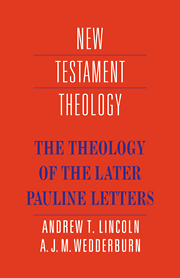Book contents
- Frontmatter
- Contents
- Editor's preface
- Note on citations
- THE THEOLOGY OF COLOSSIANS
- 1 The background of Colossians
- 2 The theology of Colossians
- 3 Colossians, the Pauline Corpus and the theology of the New Testament
- 4 The continuing influence of Colossians
- THE THEOLOGY OF EPHESIANS
- Guide to further reading — Colossians
- Guide to further reading — Ephesians
- Index — Colossians
- Index — Ephesians
2 - The theology of Colossians
Published online by Cambridge University Press: 30 October 2009
- Frontmatter
- Contents
- Editor's preface
- Note on citations
- THE THEOLOGY OF COLOSSIANS
- 1 The background of Colossians
- 2 The theology of Colossians
- 3 Colossians, the Pauline Corpus and the theology of the New Testament
- 4 The continuing influence of Colossians
- THE THEOLOGY OF EPHESIANS
- Guide to further reading — Colossians
- Guide to further reading — Ephesians
- Index — Colossians
- Index — Ephesians
Summary
The chief focus of theological interest in Colossians is the hymn of 1.15–20 and the use which the author of the letter makes of it, for it contains ideas and claims for the status and work of Christ which are to some extent unparalleled in the New Testament. That in turn raises a hermeneutical problem which will also concern us in chapter 4: once one recognizes a difference, at least of emphasis, between the author and the hymn, does one interpret the hymn in its own right or only as the author of Colossians utilizes it? For this is a text that is part of a canon to which a religious community, the Christian Church, looks at least for guidance (or which serves as an authoritative norm for some). To whom are they to listen, only to the witness to Christ of the author of the letter or also to the at least differently nuanced witness borne by those whom the writer quotes?
Yet there is more to Colossians than just the hymn and its interpretation and application to the situation in Colossae, and so this chapter looks also at two other important features of the letter, its ‘realized eschatology’ which seems to reflect a marked development of Pauline theology, and the relationship between its theology and its ethical teaching, a relationship which is basically Pauline in structure, even if the ethical teaching which flows from it bears distinctive marks of Graeco-Roman culture and of the thought-world of the hymn, features which distinguish it in certain respects from the ethical teaching of the letters agreed to be by Paul.
- Type
- Chapter
- Information
- The Theology of the Later Pauline Letters , pp. 23 - 57Publisher: Cambridge University PressPrint publication year: 1993

